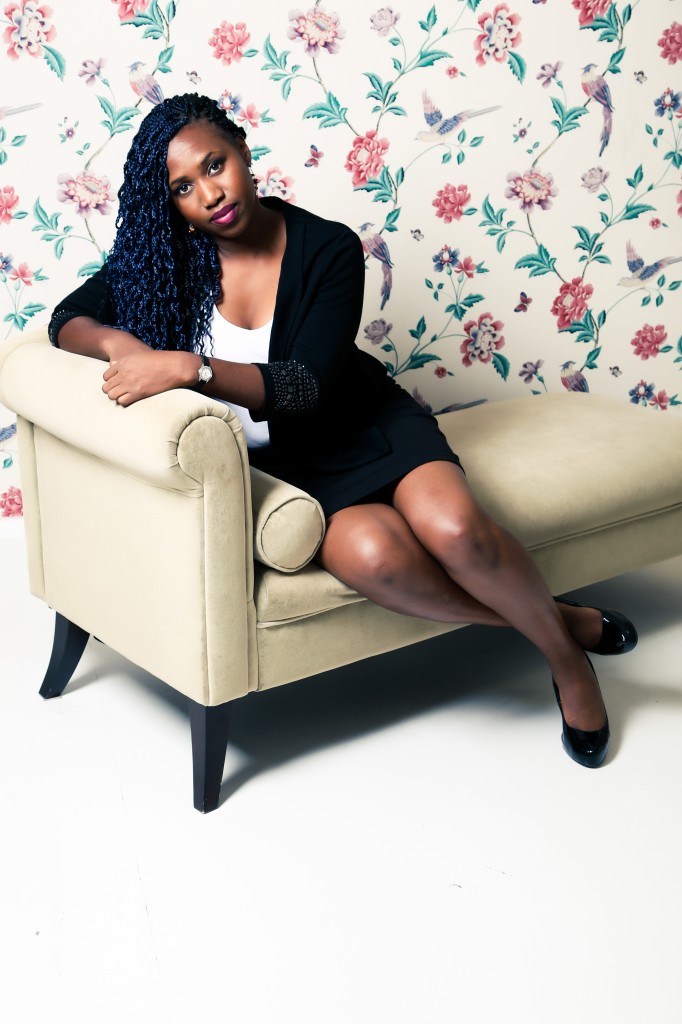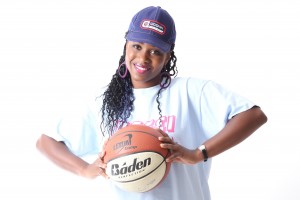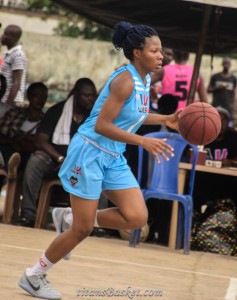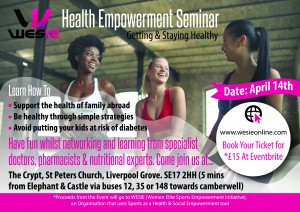A League of Her Own: An Interview with FE Adeniji

British-Nigerian pharmacist, charity CEO, former semi-professional basketball player, author and all-round phenomenal woman, FE Adeniji (aka Ma Titia) discusses her audaciously-titled new book Truth about Health Exposed, why she set up a sports empowerment NGO for women and finding that all-important work-life balance.
You have a background in pharmacy, specifically sexual health. You said the inspiration to write ‘Truth about Health Exposed’ came after a discussion you had with a pastor. Could you expound a little on that catalytic conversation?
I had spent a few years working as a specialist HIV pharmacist. There’s a lot of stigma, especially within the black community. I have personally been involved in the care of at least a handful of patients that died because they refused to take their medication. On a number of occasions they’ve said that they are Christians, they don’t believe in medicines and they don’t believe in the diagnosis they’ve been given. Some said their pastor had encouraged them because God’s going to [heal them]. It’s really, really frustrating as I’ve watched people die before my eyes. I once had a young patient, a mother of four, who just wouldn’t engage. By the time she started to, it was so far down the line that there was a limit to what we could do. I remember speaking to a pastor and telling him it’s really frustrating because as a Christian myself, I find it hard to speak to these people. You try to engage them and it’s a challenge.
At the time, I’d already started doing talks in the community including at church. The pastor mentioned that when you speak to people they only retain 15% of what you say; a book will allow you to reach a much larger audience. I thought “That’s a brilliant idea!” I also set up a NGO (Women Elite Sports Empowerment Initiative (WESEI) using sports as a health and social empowerment tool. I could use the income that I generate from the book to raise much needed funds for the organisation.
What is it you believe your book offers to the health-conscious reader that isn’t already available on the market?
I’m aware of what’s out there. If anything, there’s information overload. The book might not be for the health fanatic although, dare I say, there are a couple of things people (including myself) can learn from it. I’ve gone deeper than your five-a-day and fitness which, in my opinion, a lot of health books tend to focus on. I do talk about food and fitness, but I’ve tried to put it into context in a way I feel is not complicated. It’s not overly-scientific or technical. I’m trying to reach the everyday person who knows some of these things already but struggles to do them.
I’ve also touched on cultural issues. I’ve touched on religion. I feel those things have a much bigger impact on our health than many of us fully appreciate. I’ve also touched on things like investing in your health, hygiene and the need to prevent infectious diseases.
Yes, the chapter on environmental health is particularly thought-provoking.
I wrote that because on a day-to-day basis, when we’re seeing patients, it’s very hard to speak about personal hygiene. I try to be very holistic in the book, that’s why I feel it is unique. I guess it would be down to the reader to make that decision.
You place particular emphasis on social and psychological well-being in your book. What was the reasoning behind that?
The whole theme was to start from the basics and bring people in. I could only do that by looking at health in its entirety.
There are three key elements of health from WHO’s point of view. There are a lot of people I’ve seen (especially – but not exclusively – the elderly) for whom loneliness and not having a strong network have an impact on their health. If you think about it, loneliness leads to depression and/or anxiety. Those in turn can lead to high blood pressure etc. It is all encompassing. I cannot write a book about health without talking about these vital elements.
You also do podcasts and there are personalised health improvement plans. Can you give us an overview of these off-shoots of the book?
I started the podcasts firstly to support what I was writing in the book. Secondly, my cousin and sister were telling me they weren’t much into books – “I might buy it because you’ve written it but I’d much rather have something I can listen to on the go” – I realised to cater to a younger and a wider audience, I had to think about other means of communication. I’ve done a few YouTube videos as well. (Anyone who follows and likes us on Facebook and Twitter can get exclusive live access to the podcasts and videos.)
Along the line, as I was writing, I realised that there were a couple of new things that I didn’t know myself. Since some of it was anecdotal as much as it was evidence-based, I didn’t want to put it out there without seeing if it worked. I did a plan for myself and I did one for someone else and it worked for them. It also worked for me.
It’s really about planning your own health improvement. It is a unique and very personal journey. I realised that there are a lot of people who need a one-to-one service. I’ve therefore added a bespoke programme.
In regards to the struggles faced by the NHS, you seem to have resigned yourself to the use of private healthcare and advocate readers to have it as a back-up. Is this not a slippery slope which only strengthens the resolve of policy-makers who are ideologically opposed to free health care at the point of use? Wouldn’t it be better and more effective in the long term for health professionals and the public to apply political pressure to resist these policies?
I take your point. That’s why in the book I did highlight the challenges faced by the NHS. Yes, in an ideal world, the government should provide healthcare free at the point of entry. That is the principle on which the NHS was founded. I do believe 100% in that and I do think it’s doable. However, I accept the country we live in and how things are. I do feel people should pay or contribute towards their health just because things have changed a lot. New drugs, treatments and techniques are coming out that are much more expensive.
What I was trying to say in the book is that I want people, including the government, to be honest about what’s going on. A lot of things are being privatised through the back door, whether we like it or not. If we are going down that route, is there a better way for it to happen such that some of the bad consequences of private healthcare don’t become a reality?
Remember; this is about meeting people where they are now. Policy changes take time. If you’re diagnosed with cancer or kidney disease today, you might not be able to wait for the system to become perfect.
How have you found the self-publishing journey?
Oh my gosh! If I’d been told about this beforehand…There are so many things I have learnt along the road.
This was meant to be out a year ago. It took me a year to write the book and then the publishing process took another year. I didn’t anticipate that.
I don’t get much of the profit, either. The publishers get a decent percentage. Amazon, which is one of the major distributors, takes about 60%. Given that one of the reasons I wrote it was to raise funds, it would defeat the objective if I sold it much cheaper.
On the self-publishing route, you have to promote yourself. I thought it was just a case of writing a book and that’s it. The reality is very, very different as I’m learning. You have to do your best to be visible whereas, if you have a main publisher, they do a lot of that for you.
I think I’ve had to learn a bit from the music industry. Now I understand when some musicians say albums don’t sell any more and how the record label takes a lot of the money. You see the glamour and glitter but that’s not the reality.
I’ve also become a lot more IT savvy. I used to live in the dark ages. I’ve had to learn a lot more about how to use social media. I’ve had to learn about marketing… I guess it is a good thing. It’s learning and acquiring new skills which may come in handy in future.
You have started your own non-profit organisation The Women Elite Sports Empowerment Initiative (WESIE). How did it come about and what are your objectives?
It came about because of my personal journey as an athlete; the challenges I faced and the lack of opportunities. There’s so much focus on male sports. They get the best deal even though women work just as hard. I had a lot more negative than positive experiences with coaches too. I thought about coaching but I felt I would go through the same challenges I went through as a basketball player.
I started putting things in motion [for the NGO] in 2011/12. I went to an international conference in America. They talked about holding sports camps in Africa and using it to mobilise people. I remember thinking “what if one went a step further?” As I was setting up, I realised that I could combine both my experience in the health sector and sports and use it as an effective tool. [Sports] can be used to address gender inequality as well as social and health issues.
There are a lot of people doing sports’ empowerment but I feel I’m coming from a slightly different angle. It’s not just about doing camps. I recognise that there need to be opportunities for women to compete professionally and to get paid. Otherwise, they don’t really experience the full benefits of sports and neither do their communities. Look at the premier league and NBA, how much money they generate. Look at how much difference it makes to the athletes, their families, their communities… Many women drop out of sports because there just aren’t those opportunities.
A lot of my sports events to date have been done in Africa. The interest and passion on the ground just seems a little bit greater than what I’ve experienced in the UK. I’ve realised different settings require slightly different approaches.
This leads perfectly into the next question. You are currently based in Britain. Most of WESEI’s activities take place in Nigeria. What are the greatest challenges you face running a charity abroad and dividing your time between two countries?
[She laughs] The greatest challenge is you’re dealing with different cultures and psyches.
Obviously, I have to travel as well. It means I can only do a flexible job. The charity is the focus and everything has to work around it.
Also when I began the NGO, I started in the Niger Delta region. I didn’t realise a lot of funders had blacklisted that area because of the [socio-political] problems. Trying to get funds has been extremely, extremely challenging because of the nature of the work. I think anyone following in these footsteps should really think it through. It’s not for everyone. It takes a lot of your own personal time and funds. It’s not always sustainable so you have to be creative. That’s why support is invaluable.
In regards to balance, have you had to apply and internalise some of the principles you mention in the book?
I think my social health has suffered a bit. On my personal plan I have tried to address that but I’ve struggled. It is hard. This is a full time job and I also work full time as I need to pay the bills. I am conscious of the fact that I need to practise what I preach. I try very hard to do that. The good thing about doing the book is it forces me to speak to a wide variety of people and network. That’s having a positive impact on my social well-being.
Lastly, how can potential supporters get involved with WESIE?
Anyone buying this book will be helping us to further that vision. That’s one way. There are other things people can do such as liking and following us on socialmedia. You can donate on the website but it not just about money. You could have business contacts who might be interested in sponsoring us. Get in touch if there’s a way you think you can help us or we can work together. Our ears are wide open.
WESIE’s first 2018 seminar takes place in London on Saturday 14 April. Further information is available here.
Truth About Health Exposed-
www.truthabouthealthexposed.com
https://www.facebook.com/trueabouthealth
https://twitter.com/trueabouthealth
https://www.instagram.com/ma_titia/
Purchase a copy on Amazon
WESIE-
www.wesieonline.com
https://www.facebook.com/wesieonline/
https://twitter.com/wesie
https://www.instagram.com/wesieonline/
This is an edited version of a longer interview.





